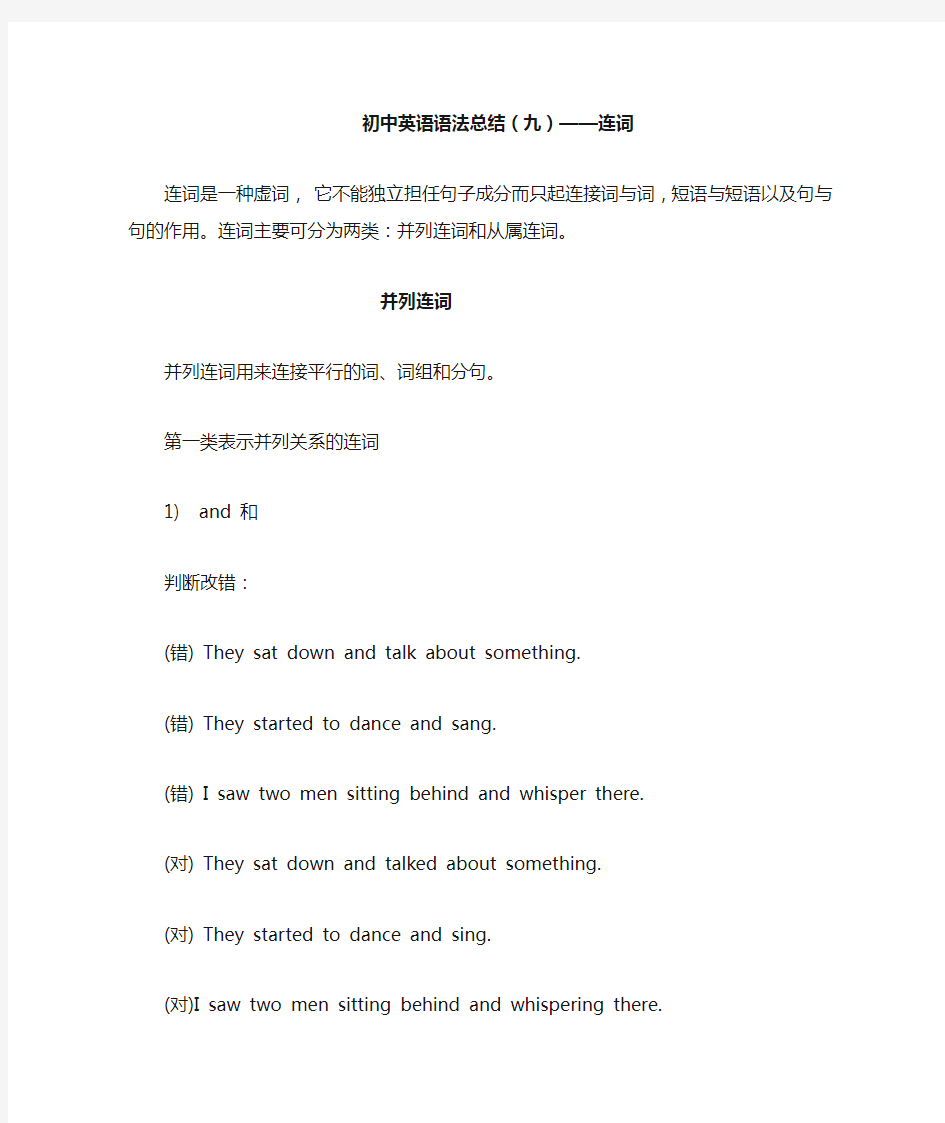(完整版)初中英语连词的用法


初中英语语法总结(九)——连词
连词是一种虚词,它不能独立担任句子成分而只起连接词与词,短语与短语以及句与句的作用。连词主要可分为两类:并列连词和从属连词。
并列连词
并列连词用来连接平行的词、词组和分句。
第一类表示并列关系的连词
1)and 和
判断改错:
(错) They sat down and talk about something.
(错) They started to dance and sang.
(错) I saw two men sitting behind and whisper there.
(对) They sat down and talked about something.
(对) They started to dance and sing.
(对)I saw two men sitting behind and whispering there.
解析:
第一句:and 连接两个并列的谓语,所以talk 应改为talked。
第二句:and 连接两个并列的动词不定式,第二个不定式往往省略to,因此sang 应改为sing。
第三句:and 连接感观动词saw 后面的用作的宾补的两个并列分词结构,因此whisper 应改为whispering。
注意:1. and 还可以和祈使句或名词词组连用表示条件。(or也有此用法)
Make up your mind, and you'll get the chance.
= If you make up your mind, you'll get the chance.
One more effort, and you'll succeed.
= If you make one more effort, you'll succeed
2, A and B 当表示整体或者指同一人时谓语动词用单数, 当and连接的单数名词前分别有each,every,many等词修饰时,谓语也用单数。
bread and butter a knife and fork
The mother and teacher is very strict with her son.
No teacher and no student is allowed to smoke in class.
3. and连接的是两个相同意思的词,表示“渐渐”,或加强语气
Read it again and again
2)both …and两者都
She plays (both) the piano and the guitar.
3) neither…nor 意思为"既不……也不……"谓语动词采用就近原则,与nor后的词保持一致。
Neither you nor he is to blame.
4)not only…but (also)不但······而且······
She plays not only the piano, but (also) the guitar.
注意:not only…but also 关联两个分句时,一个分句因有否定词not 而必须倒装。
Not only does he like reading stories, but also he can even write some.
5) as well as 以及,也,与···同样
The teacher, as well as the students, is interested in the activity.
比较and和or
1) 并列结构中,or通常用于否定句,and用于肯定句。
2) 但有时and 也可用于否定句。请注意其不同特点:
There is no air or water in the moon.
There is no air and no water on the moon.
在否定中并列结构用or 连接,但含有两个否定词的句子实际被看作是肯定结构,
因此要用and。
典型例题
---I don't like chicken ___ fish.
---I don't like chicken, ___ I like fish very much.
A. and;and
B. and;but
C. or;but
D. or;and
答案C。否定句中表并列用or, but 表转折。
判断改错:
(错) We will die without air and water.
(错) We can't live without air or water.
(对) We will die without air or water.
(对) We can't live without air and water.
第二类表示选择关系的连词
1) or意思为"或则"。
Which do you prefer, tea, coffee, or juice ?
2) either…or意思为"或者……或者……"。注意谓语动词采用就近原则。
Either you or I am right.
3) or else/ otherwise 否则
Be silent, or else you will be kicked out.
I am tired, otherwise, I would play.
第三类表示转折或对比关系的连词
1)but 但是He is rich but unhappy.
while 然而,表示对比意味Some people love cats, while others hate them.
yet 然而She said she would be late, yet she arrived on time.
however 然而,可是,不过She does not like him, however, I like him.
2) not…but…意思为"不是……而是……"
not 和but 后面的用词要遵循一致原则。
They were not the bones of an animal, but (the bones) of a human being.
典型例题
--- Would you like to come to dinner tonight?
--- I'd like to, ___ I'm too busy.
A. and
B. so
C. as
D. but
答案D。but与前面形成转折,符合语意。而表并列的and,结果的so,原因的as都不符合句意。
第四类表因果关系的连词
1)for 因为,做并列连词使用时,是在对先行的句子补述原因或者理由,只可以连接句
子与句子,通常不置于句首。
He is absent today, for he is ill.
2) so, therefore 因此
He hurt his leg, so he couldn't play in the game.
I think, therefore I am
3)then 那么,因而
Hide behind the wall, then they won’t see you.
注意:
a. 两个并列连词不能连用,但therefore, then, yet.可以和并列连词连用。
You can watch TV, and or you can go to bed.
He hurt his leg, and so / and therefore he couldn't play in the game.
b. although…yet…,但although不与but连用。
(错)Although he was weak, but he tried his best to do the work..
(对)Although he was weak, yet he tried his best to do the work.
从属连词
从属连词不同与并列连词,只能用来引导从句,而不能引导词或者词组。从属连词一般可以引导名词性从句和状语从句。
第一类引导名词性从句的从属连词
1)that 引导宾语从句或间接引语时,可省略。引导主语从句时不可以省略。
He said (that) he would come. 宾语从句
His mother told me (that) he is a good boy. 间接引语
That she is still alive is true. 主语从句
2)if/whether 是否
I wonder if he is at home.
I ask him whether he would come.
注意:只可以用whether的情况
介词后面It will depend on whether it rains tomorrow.
whether···or not 固定搭配Let me know whether you come or not.
动词不定式前I don’t know whether to accept his advice.
第二类引导状语从句的从属连词
1)连接时间状语从句的从属连词
before 在···之前The war had been over before he came to China.
after 在···之后He came to China after the war was over.
since 自从I have lived in this city since I was born.
when/while 当···The teacher entered the classroom, when all the students
were playing
When I came into this room, I found him lying bed
asleep (while后接的动词是延续性的动词)as 当···I saw her as I was getting on the bus.
till/until 直到I didn’t go to sleep until/till I finished my homework.
as soon as 一···就···As soon as he saw the policeman, the thief run away.
2)连接地点状语从句的从属连词
where 在哪里There were lots of parks where I lived.
3)连接原因状语从句的从属连词
because 原因,用于解释某事的原因,动机,强调直接原因和因果关系
I do it because I like it.
for 表因为,表间接的原因,用于说明,解释I soon went to sleep, for I was tired
since 表原因,比because弱,比as强,表一种已知的,显然的理由,常译为“既然
as 表原因时,意义最弱As you are in poor health, you should do more exercises
4)连接结果状语从句的从属连词
so···that···如此···以至于···He is so kind that everybody likes him.
such···that···He is such a kind man that everybody
likes him
5)连接目的状语从句的从属连词
that / so that / in order that 为了
Speak clearly that/so that/ in order that they may understand you.
6) 连接条件状语从句的从属连词
if 如果If it rains tomorrow, we won’t go on a picnic.
unless 除非(如果不) He will come unless it rains.
in case 万一You may call this number in case I am not at home
7)连接比较状语从句的从属连词
than 比It’s easier than I thought.
as/so···as···和···一样She is as tall as you.
He is not as/so tall as his wife.
8)连接方式状语从句的从属连词
as 按照Do as I told you.
Take things as they are.
as if / though 仿佛He behaves as if/though he was a child.
9)引导让步状语从句的从属连词
although/though 尽管Although Japan is small, the population is big.
even if 即便Even if it was snowing heavily, we went on running.
